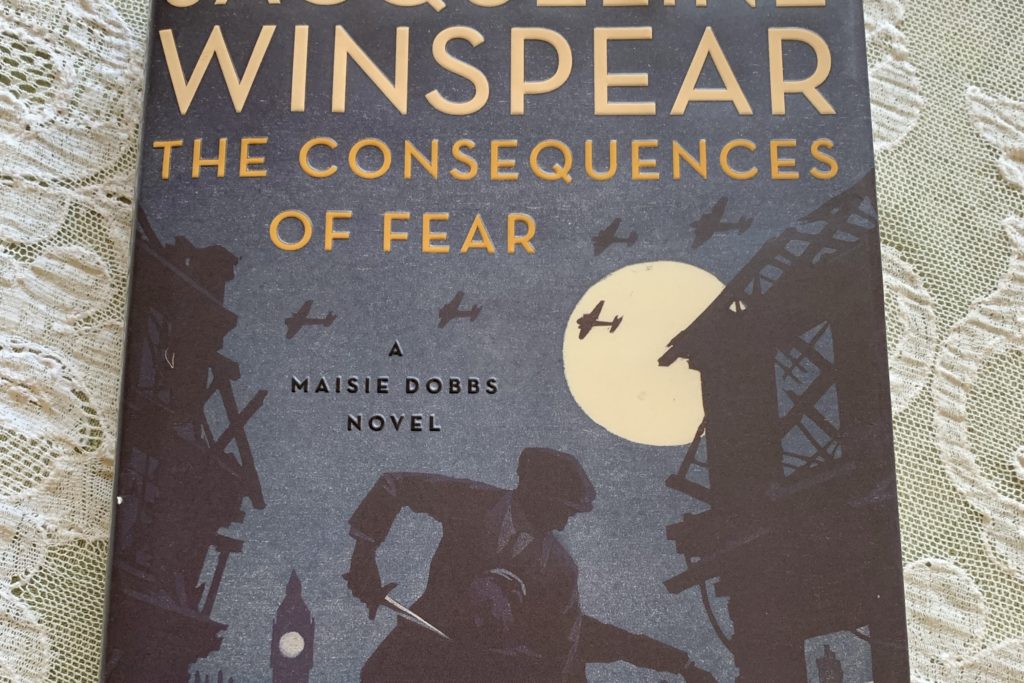There is something about a detective series: Gamache in Three Pines, Stephanie Plum in Trenton, Ian Rutledge in obscure villages in England, and, my all-time favorite, Maisie Dobbs, mostly set in London and Chelmsford and, occasionally in other European locales. A great series grips me because I come to know and care about the characters. The hard part is waiting. If you follow a particular series as it is published, there is no opportunity for binging. After you finish the new book, you must wait, sometimes more than a year. But maybe that required anticipation means I love the books even more!
I first started reading the Maisie Dobbs books by Jacqueline Winspear—there are 18 of them now–when the first one appeared in 2003. My crush on the series is almost two decades old. A motherless daughter, Maisie, as a young girl, is placed in service on the Compton estate. Impressed by Maisie’s thirst for learning, Lord and Lady Compton arrange for their friend, Maurice Blanche, to tutor Maisie; she earns a place at Girton College, Cambridge, but leaves soon after to nurse in France. After WWI, she finishes college and serves a sort of apprenticeship with her mentor, Maurice, whose understanding of psychology is well ahead of his time. Even in those early stories, Maisie is using her compassion and logic to unravel mysteries. Once she hangs out her shingle as a private investigator, Maisie uses elements of what we would identify as mindfulness and meditation as parts of her practice. She solves cases with long sheets of rolled papers, colored pencils, and stacks of index cards filled with her handwritten notes, a deliciously low-tech system.
Even more compelling than the mysteries she solves is Maisie’s backstory. Winspear knows everything about her heroine and helps us come to know her more and more deeply. The mysteries themselves are fascinating—suspenseful but usually not too gory–drawing a portrait of England between two wars. Winspear gets all the details right; she transports us into Maisie’s world, helping us see her London flat, contrasted with the more spacious manor house she inherits from Maurice. We see her in her motor car, her hair bobbed, just enough details about food and clothing and the landscapes she inhabits to help us picture her. Eventually, Maisie is entangled with Scotland Yard, which helps place her adventures in a variety of unusual settings and offers conflict with the irascible higher-ups, who do not take kindly to having a woman meddling in their cases. Maisie has a sense of duty and obligation—to her widowed father, to her employees, to the Comptons, who care for her so deeply, and to her clients. She is a woman of integrity, clarity, and purpose, but she is no paragon. We see her struggle, mourning Maurice’s death and feeling furious at idiotic people who put themselves and her in danger.
Of course, there’s also love. Those of us who have come to know Maisie over the years ached with her for love lost and felt a momentary flash of anger at Winspear when she killed off Maisie’s first husband, James, in a useful plot twist. I am mindful of not giving more away–a challenge when writing about novels that hinge on crimes!
Though the situations are gripping, it’s Winspear’s characters and the ways in which Maisie interacts with them that resonate long after I close a volume. Maisie employs Billy Beale as her associate and a secretary, Sandra. The devoted reader comes to love them and their families, too. Sometimes, I find myself wondering what they are up to, forgetting that they are consigned to the pages of a book. There’s Priscilla, Maisie’s friend from university, her three sons and long-suffering husband. Pris is wealthier and more carefree than Maisie, but relies on her friend’s good sense and calm as she manages through family crises. Maisie’s father, Frankie Dobbs, and his brisk but sympathetic wife, Brenda, worry that Maisie puts herself in harm’s way—worries that are generally well-founded. Lord and Lady Compton, parents of Maisie’s first husband, James, love Maisie as a daughter, but they grow increasingly frail as the series progresses. And then, there’s Anna, the winsome child Maisie ultimately adopts—Anna allows Maisie to show her tender side as she leaves Anna, who lives with Frankie and Brenda, for her work in London.
The most recent book, The Consequences of Fear, is a nifty one—riveting right from the start. It’s 1941. Maisie’s cases keep her from spending as much time as she wants with her beloved Anna. There’s a murder witnessed by a messenger boy, and Maisie must untangle all the threads, which she does with typical skill and plenty of romantic tension plus some school-bullying woven through the tale. To say more would deprive you of reading the story yourself. Know that the day it arrived, it felt like an opportunity to indulge in a box of chocolates all by myself. My one regret is that I read quickly. Once I finished it, I knew I would have to wait another year to immerse myself once again in the world of Jacqueline Winspear’s creating. Indulge. Start the series from the beginning. Maisie reminds me that a cool head and a few deep breaths are always an effective way to approach a dilemma, whether or not there’s a crime to be solved!

